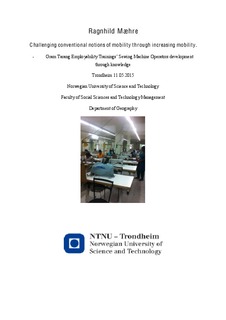| dc.description.abstract | This thesis is looking at how conventional notions of mobility, in the rural areas of Mayurbhanj in the state of Odisha in India, can be challenged due to an increase in mobility through the skill training program of Gram Tarang Employability Training, GTET. The skill training in focus is the Sewing Machine Operator program which attempts to meet the apparel industry's global demand of apparel. By using a theoretical framwork of previous studies of mobility, female mobility, shifting social requirements in village households and benefitsharing and through research on the GTET trainees, I am discussing how human mobility is changing in India. Through the theoretical framework I am looking at the evolving aspects of mobility, and comparing human mobility in the global south with the global north.
The case study is developed through several semi-structured interviews and focus group discussions. The interviews are conducted with families of GTET trainees in the rural areas of Mayurbhanj, with GTET trainees at the training center in Centurion University in Jatni, Bhubaneswar as well as with trainees who are employed in the apparel industry in Bangalore. The case study is focusing on the external and internal influences of human mobility, how mobility through the SMO program is favouring female labour in consideration to benefit sharing, and lastly how knowledge is contributing to covering development needs in the villages.
The empirical data from these interviews is presented in the analytical framework, describing the attitudes and changes in human mobility expressed and experienced by the rural people of Mayurbhanj. Different modes of mobility is discussed along with how the knowledge gained through GTETs SMO program is challenging conventional notions of mobility. The analysis discusses the benefits and downsides of human mobility in Mayurbhanj, and how mobility is changing gender roles and gender equality. This thesis attempts to provide an understanding of how female mobility can increase development through GTET, and how mobility is not only a cause of modernity, but a part of history. | nb_NO |
